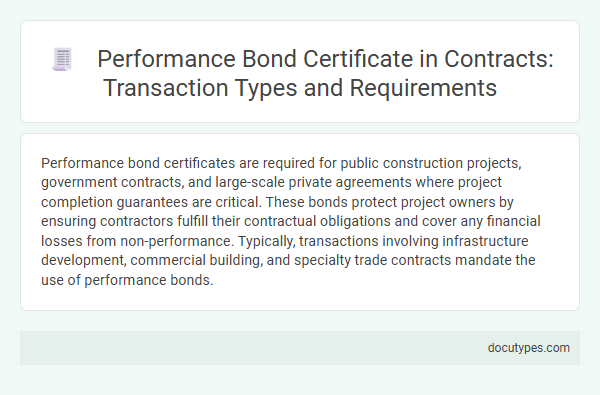Performance bond certificates are required for public construction projects, government contracts, and large-scale private agreements where project completion guarantees are critical. These bonds protect project owners by ensuring contractors fulfill their contractual obligations and cover any financial losses from non-performance. Typically, transactions involving infrastructure development, commercial building, and specialty trade contracts mandate the use of performance bonds.
Introduction to Performance Bond Certificates in Contracts
| Introduction to Performance Bond Certificates in Contracts | |
|---|---|
| Definition | A performance bond certificate is a financial guarantee issued by a bank or insurance company to ensure the completion of a contract according to its terms. |
| Purpose | Protects the project owner by providing assurance that the contractor will fulfill their obligations or compensate for any failure to perform. |
| Types of Transactions Requiring Performance Bond Certificates | |
| Construction Contracts | Most common use, especially in public infrastructure projects and large-scale private developments. |
| Government Contracts | Mandatory in many cases to guarantee compliance with contractual specifications and deadlines. |
| Service Agreements | Used in projects requiring guaranteed performance of services over a period, such as maintenance or consulting agreements. |
| Supply Contracts | Ensures suppliers fulfill delivery schedules and quality standards as per contract terms. |
| Large-Scale Commercial Projects | Often require performance bonds to mitigate financial risk in long-term or high-value transactions. |
| Why You Need a Performance Bond | Securing a performance bond certificate increases trust and credibility, protecting your interests throughout the contract lifecycle. |
Definition and Purpose of Performance Bond Certificates
A performance bond certificate is a financial guarantee issued by a surety company ensuring the completion of a contract according to its terms. This certificate protects the project owner from losses caused by the contractor's failure to fulfill contractual obligations. Transactions involving construction projects, government contracts, and large-scale service agreements commonly require a performance bond certificate.
Key Components of a Performance Bond Certificate
A Performance Bond Certificate is essential in construction, service, and supply contracts to guarantee project completion according to agreed terms. Key components include the bond amount, which represents the financial security provided, the obligee who requires the bond, and the principal who must fulfill the contract obligations. The certificate also specifies the bond duration and conditions under which the bond can be claimed, ensuring protection against non-performance or default.
Common Transaction Types Requiring Performance Bonds
Performance bond certificates are essential in various contract transactions to guarantee the completion of work according to agreed terms. These bonds protect project owners from financial loss due to contractor default or non-performance.
Common transaction types requiring performance bonds include construction projects, government contracts, and large-scale service agreements. In construction, bonds ensure contractors fulfill their obligations for labor, materials, and project timelines. Government contracts frequently mandate performance bonds to secure public funds and ensure accountability throughout the contract duration.
Legal Framework Governing Performance Bond Certificates
Performance bond certificates are legally mandated in various contract types to ensure project completion and financial security. The legal framework surrounding these bonds governs their issuance, enforcement, and claims processes.
- Construction Contracts - Often require performance bonds to guarantee the contractor fulfills project specifications and deadlines.
- Government Procurement Transactions - Mandate performance bonds to protect public funds and ensure contractor accountability.
- Service Agreements - May necessitate performance bonds when substantial financial risks or deliverable guarantees are involved.
The legal framework defines the obligations of all parties and provides mechanisms for bond enforcement during contract disputes.
Obligations and Liabilities of Parties Involved
Performance bond certificates are commonly required in construction, service, and supply contracts to guarantee the fulfillment of the contractor's obligations. These bonds protect the project owner from losses if the contractor fails to complete the work as agreed.
The parties involved include the principal (contractor), obligee (project owner), and surety (bond issuer), each bearing specific liabilities. You must ensure the contractor provides a performance bond before starting to mitigate risks associated with non-performance or delays.
Documentation and Application Requirements
Performance bond certificates are essential in various contracts to guarantee the completion of obligations by the contractor. These documents protect project owners by ensuring financial compensation if contract terms are not met.
- Construction Contracts - Required documentation includes the signed contract, project specifications, and contractor's financial statements to apply for a performance bond certificate.
- Government Procurement Transactions - Application requires compliance certificates, bid documents, and proof of capability to fulfill the contract under public procurement regulations.
- Large-Scale Supply Agreements - Submission of detailed project schedules, supplier agreements, and evidence of prior successful project completions is mandatory for obtaining a performance bond certificate.
Process for Issuing and Claiming Performance Bonds
Which types of transactions require a performance bond certificate? Construction contracts, government projects, and large-scale service agreements commonly mandate performance bonds. These bonds ensure contractor compliance and protect clients against project failures.
What is the process for issuing a performance bond certificate? The contractor applies through a surety company that evaluates financial stability and project scope before approval. Upon approval, the bond certificate is issued, guaranteeing contract fulfillment.
How can one claim a performance bond in case of default? The project owner must submit a formal claim to the surety company with evidence of contractor non-performance. After verification, the surety compensates the owner or arranges for project completion.
Benefits of Performance Bond Certificates in Contracts
Performance bond certificates are essential for construction, supply, and service contracts to guarantee project completion and adherence to agreed terms. These bonds protect project owners by ensuring financial compensation if contractors fail to meet their contractual obligations.
Using performance bonds reduces the risk of delays, cost overruns, and substandard work, fostering trust and security between parties. Your involvement in contracts with performance bonds provides peace of mind through legally backed assurance of successful transaction execution.
Which Types of Transactions Require a Performance Bond Certificate? Infographic

